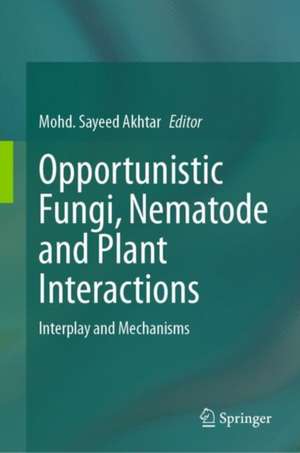Opportunistic Fungi, Nematode and Plant Interactions: Interplay and Mechanisms
Editat de Mohd. Sayeed Akhtaren Limba Engleză Hardback – 15 iun 2024
This book is of interest and useful to teachers, researchers, and professionals working on plant nematology, pathology, ecology, soil science, host-plant interactions, microbial ecology, and industries. Aside from that, this book also serves as additional reading material for undergraduate and graduate students all over the globe, as well as agricultural scientists and policymakers.
Preț: 1210.45 lei
Preț vechi: 1476.16 lei
-18% Nou
Puncte Express: 1816
Preț estimativ în valută:
231.76€ • 237.74$ • 195.13£
231.76€ • 237.74$ • 195.13£
Carte disponibilă
Livrare economică 05-19 februarie
Preluare comenzi: 021 569.72.76
Specificații
ISBN-13: 9789819720446
ISBN-10: 9819720443
Pagini: 340
Ilustrații: XVI, 215 p. 11 illus., 10 illus. in color.
Dimensiuni: 155 x 235 mm
Greutate: 0.49 kg
Ediția:2024
Editura: Springer Nature Singapore
Colecția Springer
Locul publicării:Singapore, Singapore
ISBN-10: 9819720443
Pagini: 340
Ilustrații: XVI, 215 p. 11 illus., 10 illus. in color.
Dimensiuni: 155 x 235 mm
Greutate: 0.49 kg
Ediția:2024
Editura: Springer Nature Singapore
Colecția Springer
Locul publicării:Singapore, Singapore
Cuprins
1. Interactions of opportunistic fungi, plants and plant parasitic nematodes.- 2. Opportunistic fungi, plant, and nematode interactions in agricultural crops.- 3. Opportunistic fungi, plant and nematode interactions in vegetable crops.- 4. Biochemical changes in host-plant invaded by opportunistic fungi and nematodes.- 5. Response of ROS in host-plant assaulted by opportunistic fungi and nematodes.- 6. Functions of flavonoids in plant, pathogen, and opportunistic fungal interactions.- 7. occupancy of flavonoids in plants, pathogen, and opportunistic fungi interactions.- 8. Mode of interactions between opportunistic fungi, nematode and other soil microbiota.- 9. Molecular interactions between opportunistic fungi, nematodes and plants.- 10. Involvement of parasitism proteins in plant nematode and opportunistic fungi connections.- 11. Role of life style pattern and soil micorbiome interaction of Arthrobotrys species for the biostimulant production.
Notă biografică
Dr. Mohd. Sayeed Akhtar is currently working as a senior assistant professor in Gandhi Faiz-e-Aam College, Uttar Pradesh, India. He received his PhD degree from Aligarh Muslim University (AMU), India in 2008, and then conducted his post-doctoral research at the Botanical Institute, University of Basel (BIB), Switzerland (2008–2010), and Chonbuk National University (CBNU), Republic of Korea in 2011. Dr. Akhtar has published 150+ articles in peer-reviewed journals, conference proceedings, and book chapters, and has edited 21 books with international publishers. He is a member of the International Society for Development and Sustainability, Japan, Plantae Group, American Society of Plant Biologists, International Society of Environmental Relationship and Sustainability, Chennai, India and International Service for the Acquisition of Agri-Biotech Application (ISAAA), Manila, Republic of the Philippines. His research work focuses on the molecular biotechnology, bioremediation, biomineralization, nano-fertilizers, and nanobiotechnology of rhizospheric plant-microbe interactions.
Textul de pe ultima copertă
This book covers the fundamental and applied characteristics of opportunistic (OP) fungi, plant parasitic nematodes (PPN), and plant interactions. Fungal behavior and cultivation, physiological and molecular changes in relation to hosts and pathogens, and the mechanistic aspects of their management strategies are also covered in this volume. In the diverse agro-climatic conditions of the world, PPN has been identified as the most damaging pest to a variety of commercial and agro-important crop plants. Various chemical nematicides have been widely employed to treat nematode infection in recent decades, but use of these chemicals has been restricted due to widespread concerns about human health and environmental safety. In this regard, rhizospheric microorganisms can act as a first line of defense against pathogen attacks on the root and play a critical role in the management of plant diseases caused by PPN. The OP might directly parasitize the PPN by secreting metabolic chemicals that affect the viability of one or more phases of the nematode's life cycle.
This book is of interest and useful to teachers, researchers, and professionals working on plant nematology, pathology, ecology, soil science, host-plant interactions, microbial ecology, and industries. Aside from that, this book also serves as additional reading material for undergraduate and graduate students all over the globe, as well as agricultural scientists and policymakers.
This book is of interest and useful to teachers, researchers, and professionals working on plant nematology, pathology, ecology, soil science, host-plant interactions, microbial ecology, and industries. Aside from that, this book also serves as additional reading material for undergraduate and graduate students all over the globe, as well as agricultural scientists and policymakers.
Caracteristici
Acts as a guide of opportunistic fungus, plant-parasitic nematodes and plant interactions Discusses research on the fundamental and applied elements of unique underground interplay A valuable resource for plant nematologists, pathologists, ecologists, agricultural and soil scientists
